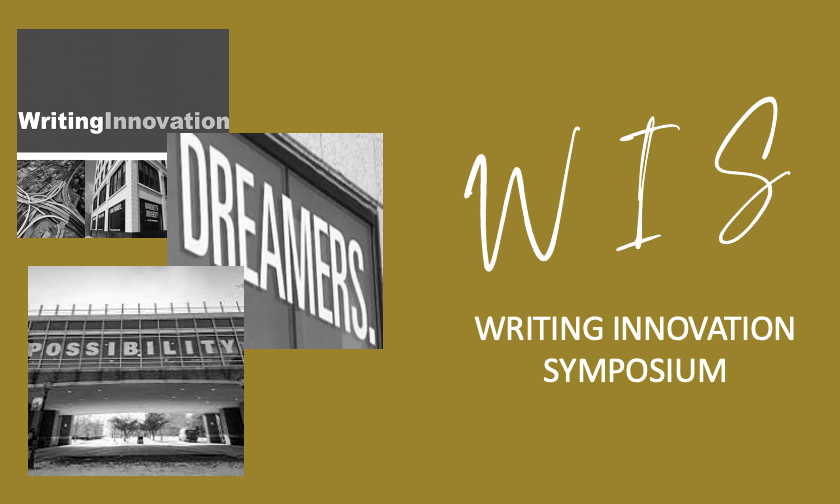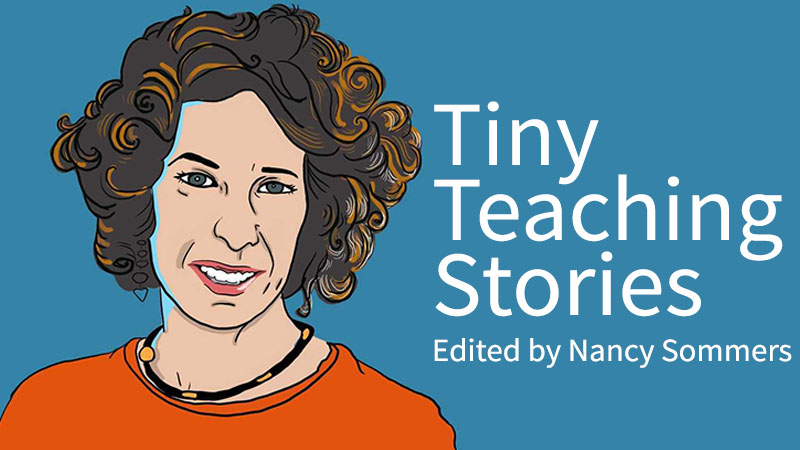-
About
Our Story
back- Our Mission
- Our Leadershio
- Accessibility
- Careers
- Diversity, Equity, Inclusion
- Learning Science
- Sustainability
Our Solutions
back
-
Community
Community
back- Newsroom
- Webinars on Demand
- Digital Community
- The Institute at Macmillan Learning
- English Community
- Psychology Community
- History Community
- Communication Community
- College Success Community
- Economics Community
- Institutional Solutions Community
- Nutrition Community
- Lab Solutions Community
- STEM Community
- Newsroom
- Macmillan Community
- :
- English Community
- :
- Bits Blog
- :
- Bits Blog - Page 27
Bits Blog - Page 27
Options
- Mark all as New
- Mark all as Read
- Float this item to the top
- Subscribe
- Bookmark
- Subscribe to RSS Feed
Bits Blog - Page 27
Author
04-08-2015
10:33 AM
This blog was originally posted on March 16th, 2015. Today’s guest blogger is Jeanne Law Bohannon. When I begin a new semester, I try to make time to reflect on my pedagogy and its implications/opportunities for student-scholars across my courses and across disciplines. This semester, I have actually done it! You may recall that last fall I blogged on a Multimodal Monday about Video Game Vlogcasting. I wanted to take that assignment and re/mix it for a different audience and purpose. Because I practice at a large state university, the core classes I sometimes teach feature a majority of students who are NOT English majors. In fact, fall semester of last year is the first time I have ever had an English major in a literature course — ever. Like other 2000 level literature courses, American Literature 1860s – present at my university is one that attracts students based not on subject, but on scheduling. Finding a balance between getting students to write authentically about content and going bust on Bloom’s taxonomy is a challenge for all of us. I have found that digital writing assignments pique student interest and challenge them to employ skills that elicit critical thinking and measurable rhetorical performances. Hosting a vlog/podcast (we call them vlog/pods) on a subject that they have already successfully written about in traditional academic form (for us, Annotated Bibliographies) gives students a composition opportunity that also engenders creativity and digital literacy. Assignment A DIY vlog/podcasting assignment that encourages students to apply researched texts to digital environments and create their own auditory and visual representations of previously researched materials. Assignment Goals and Measurable Learning Objectives Apply an annotated bibliography to a digital literacy Employ multimodalities as rhetorical delivery devices Analyze meaning through critical production of digital texts on-screen Background Reading for Students and Instructors Acts of reading and viewing visual texts are ongoing processes for attaining learning goals in democratic, digital writing assignments. Below, I have listed a few foundational texts. You will no doubt have your own to enrich this list. The St. Martin’s Handbook: Chapter 2, “Rhetorical Situations”; Section 6a, “Collaborating in College”; Chapter 7, “Reading Critically” The Everyday Writer: Chapters 5-11, “The Writing Process” Writing in Action: Chapter 4, “A Writer’s Choices”; Section 7h, “Collaboration and Communication”; Chapter 9, “Reading Critically” EasyWriter: Sections 1c-1g in Ch.1, “A Writer’s Choices”; Section 1h, “Collaborating”; Section 3a, “Reading Critically” Bohannon’s Multimodalities for Students Before Class: Student and Instructor Preparation The vlog/pod project works well on its own or bridged with other assignments. In my course, we produced vlog/pods based on Annotated Bibliographies that students had written on a subject covered in our readings. All of our readings came from marginalized authors and performers, and students chose among those subjects for their two assignments. However, you may want to use this project as a stand-alone; either way works. If you want more information on the Annotated Bibliography assignment, click here. I run this project mid-semester. Prior to starting this project, the class discusses multimodalities of texts that we produce across digital discourses. We read Bohannon’s Multimodalities for Students, MIT’s Podcasting 101,PC Magazine’s “What is a Vlog?”, Class Blog Space, and Bohannon’s YouTube Channel to prepare us to produce. In Class and/or Out Much of the readings for this assignment are already embedded in coursework. Those of you who have taught core literature courses will have your own content requirements. Some of us even have this content prescribed by our departments or colleges. Either way, this assignment gives instructors and students some creative freedom to create their own content. If you teach in a computer lab, then you are LUCKY! For those of us who don’t, we can work around it. In groups of two or three, students read resources and write outlines for their vlog/pod transcripts over three class periods. I require them to post their final transcripts with their uploaded vlog/pods. Since students are working with individual topics, they group themselves around genre or time period. They brainstorm, workshop their storyboards/outlines, and edit in class. Production happens outside of class. Many universities have vlog/podcasting studios available to students; check with your IT folks to see if your students have access to a studio. My students have successfully produced vlog/pods using, iMovie,QuickTime, Movie Maker, and Garage Band on their own. After they draft, edit, and produce their vlog/pods, students either upload them to my YouTube channel or submit their work directly into our course LMS. You may want to give your students a choice for either public or private (class only) vlog/pod dissemination. I have found that most students are excited for others to see their work, but it’s nice to have a choice. Next Steps: Reflections on the Activity At the next class meeting(s), students discuss and show their vlog/pods to the class, arranged by genre and time period. We bring popcorn (maybe not a good idea if you’re in a computer lab) and sodas and make it a red-carpet event by inviting friends and colleagues. You can either show vlog/pods in class or arrange for a larger venue on campus. Next time I run this assignment, I am going to book our library multimedia room, which holds more people and has a place for setting up food and drinks. Truthfully, though, this assignment requires students to balance traditional academic invention and public, digital text productions. In my experience I have found that learning success closely follows authentic student engagement, including democratic and digital textual productions informed by student choice. Students are far more likely to engage in any course, composition, literature, or otherwise, if they feel that they can exert their agency to affect writing and learning outcomes. For us as instructors, a vital part of our teaching is our ability to let go of our authority and guide students towards enduring understandings of content, which theyresearch, design, and produce. When we re-focus our efforts around digital, authored performances in these environments, we facilitate rhetorical growth for our students, helping them develop informed voices as they become fluent in multiple discourse communities. Try this assignment and let me know what you think. Please view/use the project guidelines (edit as you need) and view student samples here: Vlog/Pods from AmLit 2132 Also, please leave me feedback at Bohannon’s AmLit 2132. Guest blogger Jeanne Law Bohannon is an Assistant Professor in the Digital Writing and Media Arts (DWMA) Department at Kennesaw State University. She believes in creating democratic learning spaces, where students become stakeholders in their own rhetorical growth though authentic engagement in class communities. Her research interests include evaluating digital literacies, critical pedagogies, and New Media theory; performing feminist rhetorical recoveries; and growing informed and empowered student scholars. Reach Jeanne at: Jeanne_bohannon@kennesaw.edu and www.rhetoricmatters.org Want to collaborate with Andrea on a Multimodal Monday assignment? Send ideas to leah.rang@macmillan.com for possible inclusion in a future post.
... View more
1
0
1,534
Author
04-08-2015
09:14 AM
This blog was originally posted on February 5th, 2015. Flying across the country a few weeks ago, I read Diogo Mainardi’s The Fall: A Father’s Memoir in 424 Steps (you can hear an interview with the author here). It’s a slim book—166 pages—so I had time to read it twice through, which I did with pleasure and gratitude. While the story of Mainardi’s son Tito’s botched birth in a Venice hospital, which left him with cerebral palsy, is gripping from first to last, what fascinated me most about the book was its structure: it is divided into 424 brief passages, some as short as a four-word sentence (“Tito has cerebral palsy,” which opens the book), others as long as half a page. Why 424 steps? As Mainardi reveals, “four hundred and twenty-four steps” is “the farthest that Tito has ever walked” without falling. In these 424 brief passages, Mainardi introduces readers to his family and most of all to Tito in a way so full of love that I was quickly drawn in and wanted to linger there with them long after my plane had touched down. I wanted to hear about more and more steps, get to know Tito even better (the photos of Tito that accompany the text are breathtakingly beautiful). But The Fall is more than a father’s memoir and a love song to his first son; it is also a tightly woven meditation on the web of associations that circle Tito, from the Scuola Grande di San Marco’s façade, designed by Pietro Lombardo in 1489 which now stands at the entrance to Venice Hospital—scene of many mistakes, including the one made during Tito’s birth—to Ezra Pound’s praise of Lombardo and the “stupid aestheticism” that Mainardi had shared with Pound before Tito’s birth. The web gets more dense and full of cross-references as the steps proceed. This 424-step-long meditation on disability and on love got me thinking about Winston Weathers, whose book An Alternate Style (1980) introduced us to the Grammar A of school discourse and the Grammar B of, well, everything else. One of the alternates Weathers showed readers was a simple list; another was a series of what he called “crots”: bits or fragments of text. But it also reminded me of David Shields’s much more recent Reality Hunger, a manifesto made up of brief snippets of text, many of them copied verbatim from other people’s work without acknowledgment. This musing led me to consider whether the time is ripe for this particular kind of fragmented or fragmentary writing (my experience with social media writing makes me say “yes!”), and also made me want to experiment with this form, and to engage students in experimenting with it. So now I am imagining a writing assignment that would begin: “Create a series of very brief passages, all related to one topic and arranged so that they reach a climax or make a very telling point by the end.” I’d start out with low stakes—just a few pages and meant for in-class sharing rather than a formal grade. But now I’m thinking that many others may be way ahead of me and have perfected such an assignment. If you have, please share now! In the meantime, check out Mainardi’s book and get to know the amazing Tito. [Image: The Fall: A Father’s Memoir in 424 Steps by Diogo Mainardi. From Other Press.]
... View more
2
0
1,130
Author
04-08-2015
07:03 AM
This blog was originally posted on April 18th, 2014. Think 1957. Think the inimitable Jerry Lee Lewis. Or Elvis Presley. Both sang about a whole lotta shakin’ goin’ on. I said come on over baby, a-whole lotta shakin’ goin’ on Yeah I said come on over baby, a-whole lotta shakin’ goin’ on Well we ain’t fakin’, a-whole lotta shakin’ goin’ on I was a high school kid in 1957, and little did I imagine that fifty-plus years later this song would keep popping into my head in relation to digital literacy and the ways it has helped us reimagine writing as, always, multimodal. And we ain’t fakin’! Since I teach courses on digital literacies and the digital essay, I decided that this year at 4Cs, I would try to go to every session on multimodal writing. Until I saw the program, that is: there were so many panels devoted to a range of perspectives on multimodality that I would have had to clone myself several times over in order to attend them all. That fact reaffirmed what I’ve been seeing as I visit schools across the country: writing programs are increasingly inviting their students to produce multimodal projects, with some pretty stunning results. Last month in Arkansas, for example, I heard a teacher describe an assignment that asked students to create and “pitch” proposals for new apps, and another teacher describe the animated smartphone mini-lessons she and her students were producing to help each other learn and retain material. On my own campus, intructors are guiding students in doing everything from digital research projects to beautifully illustrated and published storybooks. Most important, students I encounter continue to tell me that they are highly engaged and motivated by such projects. So I was delighted to hear that Bedford/St. Martin’s was sponsoring a Multimodal Celebration during the 4Cs meeting, where participants could showcase their students’ projects. When I arrived at the celebration, the large room was already jammed with people eager to see what students across the country had come up with. Lining three sides of the room were posters describing instructor assignments—along with examples of student work in response to those assignments. Liz Losh was there talking about her students’ mini-Comic Con; Erik Ellis’s students’ fabulous storybooks were on display; posters such as the ones seen below proved yet again that today’s writers are thinking about how to use visuals and infographics to get and hold an audience’s attention. These projects testified to the imaginative, creative, and serious work being produced by students across the United States. I was particularly thrilled, since I believe we are coming close to the point of not having to label such projects as “multimodal.” In sum, it seems to me that the word “writing” will soon carry with it the assumption (entirely justified) of multimodality. As we move toward that day, I see two areas that need our careful attention. The first has to do with colleagues who are still puzzled by or resistant (or indifferent) to multimodal writing, who don’t understand how all writing could be said to be multimodal. I sympathize with these colleagues: after all, writing has a way of changing on us—constantly, and we have had a steep learning curve ever since I entered the profession, as new and emerging technologies have shaped and affected what we think of as “writing.” So we need to find ways to link what may seem new and foreboding to the tried and true principles of rhetoric and to provide support and encouragement to those who are uncomfortable with multimodality. Second, we need more research on how to assess such projects, and in this regard we can turn to our students, creating rubrics together and testing them for accuracy. Luckily, both these areas of concern are already being attended to by leading scholars like this year’s 4Cs Co-Exemplars, Cindy Selfe and Gail Hawisher. From where I stand, I think it’s safe to say that multimodal writing is alive and well and prospering in writing programs across the country. No wonder that during the Bedford/St. Martin’s celebration, participants and attendees called for a follow-up celebration of student multimodal writing next year in Tampa – to loud applause. Oh yeah, there’s a whole lot of multimodalin’ goin’ on!
... View more
1
0
1,149
Author
04-10-2014
06:30 AM
The theme of this blog, as well as Signs of Life in the U.S.A., is, of course, the practice of the semiotic analysis of popular culture in the composition classroom and in any course devoted to popular cultural study. But it is worth noting that my choice of the word “semiotics,” rather than “semiology,” is grounded in a meaningful distinction. For while the words “semiotics” and “semiology” are often interchangeable (they both concern the analysis of signs), there is a technical distinction between them that I’d like to explain here. To begin with, “semiology” is the study first proposed by Ferdinand de Saussure, and came to be developed further into what we know today as structuralism. “Semiotics,” on the other hand, is the term Charles Sanders Peirce coined (based on the existing Greek word “semiotikos”) to label his studies. But the difference is not simply one of terminology, because the two words refer to significantly different theories of the sign. Semiology, for its part—especially as it evolved into structuralism—is ultimately formalistic, taking signs (linguistic or otherwise) as being the products of formal relationships between the elements of a semiological system. The key relationship is that of difference, or as Saussure put it, “in a language system there are only differences without positive terms.” The effect of this principle is to exclude anything outside the system in the formation of signs: signs don’t refer to extra-semiological realities but instead are constituted intra-semiologically through their relations to other signs within a given system. Often called “the circle of signs” (or even, after Heidegger, ‘the prison house of language”), sign systems, as so conceived, constitute reality rather than discover or signify it. It is on this basis that poststructuralism—from Derridean deconstruction to Baudrillardian social semiology to Foucaultian social constructivism—approaches reality: that is, as something always already mediated by signs. Reality, accordingly, effectively evaporates, leaving only the circle of signs. Semiotics, in Peirce’s view, is quite different, because it attempts to bring in an extra-semiotic reality that “grounds” sign systems (indeed, one of Peirce’s terms for this extra-semiotic reality is “ground”). Peirce was no naïve realist, and he never proposes that we can (to borrow a phrase from J. Hillis Miller) “step barefoot into reality,” but he did believe that our sign systems not only incorporate our ever-growing knowledge of reality but also can give access to reality (he uses the homely example of an apple pie recipe as a sequence of semiotic instructions that, if followed carefully, can produce a real apple pie that is not simply a sign). For me, then, Peircean “semiotics” brings to the table a reality that Saussurean/structuralist/poststructuralist “semiology” does not, and since, in the end, I view the value of practicing popular cultural semiotics as lying precisely in the way that that practice can reveal to us actual realities, I prefer Peirce’s point of view, and, hence, his word. But that doesn’t mean I throw semiology out the window. As readers of this blog may note, I always identify the principle of difference as essential to a popular cultural semiotic analysis: that principle comes from semiology. For me, it is a “blindness and insight” matter. Saussure had a crucial insight about the role of difference in semiotic analysis, but leaves us blind with respect to reality. Peirce lets us have reality, but doesn’t note the role of difference as cogently as Saussure. So, in taking what is most useful from both pioneers of the modern study of signs, we allow the two to complement each other, filling in one’s blindness with the other’s insight, and vice versa. Add to this the fact that Peirce has a much clearer role for history to play in his theory of the sign than Saussure (and his legacy) has, and the need for such complementarity becomes even more urgent. And finally, when we bring Roland Barthes’ ideological approach to the sign (he called it “mythology”) into the picture, we fill in yet another gap to be found in both Saussure and Peirce. Put it all together—Peircean reality and history, Saussurean difference, and Barthesian mythology—and you get the semiotic method as I practice it. And it works.
... View more
1
0
12.7K
Author
01-13-2011
07:20 AM
One of the most important lessons to impart when teaching popular cultural semiotics is that the same phenomenon can mean something quite different when you change its historical context. This is why it is essential to situate a popular cultural topic within its own temporal framework, while at the same time comparing it to other relevant historical contexts to find the crucial differences that help mark out semiotic meaning. Take the Coen brothers’ reprise of the 1960s classic True Grit. While most of your students will be interested only in comparing Jeff Bridges’s interpretation of Rooster Cogburn to John Wayne’s, and Hailee Steinfeld’s performance to Kim Darby’s, that isn’t where the interesting cultural significance of the movie lies. To find that significance you need to look at the historical contexts of the two films. Let’s start with the original version. That movie appeared in 1969, only a year after the publication of Charles Portis’s novel of the same title. Now, by the late 1960s America was fully engulfed in a cultural revolution that was effectively splitting the country apart. Resistance to the Vietnam War was a particularly volatile flash point, and it is highly significant that only a year before the release of True Grit, John Wayne had starred in and codirected The Green Berets, a movie that was clearly addressed to American traditionalists who resented the antiwar movement (Joe, released in 1970, was similarly addressed to conservative opponents of the cultural revolution). In such a context, Portis’s novel, with its appeal to old-fashioned self-reliant individualism and law and order, not to mention its revival of a traditionalist mythology of the Old West that movies like Little Big Man (1970) would soon challenge, was a signifier of conservative reaction. (It is also significant that True Grit, both the novel and movie, revisits the fundamental material of Cat Ballou (1965), reconstituting that spoofing of the Old West as a serious homage to the frontier tradition.) Thus the appearance of True Grit as a movie in 1969 was a clear signifier of conservative pushback. Should anyone have not gotten the point, John Wayne—popular culture’s leading standard-bearer of conservative values at the time—was cast in the lead role. Fast forward to 2010. While there is still a sharp political and cultural divide in America, it does not loom so dramatically as it did in the late 1960s/early 1970s. (Can you imagine National Guard troops opening fire on an American college campus today?) The reprisal of True Grit in the current state of affairs just doesn’t have the same political force that it did the first time around. The fact that the Coen brothers—who are hardly known as conservative standard-bearers—have made the movie, and that Jeff Bridges (rather than, say, Chuck Norris) is Rooster Cogburn, also plays an important role in the depoliticization of the film. Perhaps if Clint Eastwood had starred in and directed this version things might be different, but as it stands even liberal cinephiles can be content to debate such aesthetic matters as whose interpretation of Portis’s novel is more accurate and whether Bridges’s handling of John Wayne’s only Oscar-winning role measures up to the Duke. But politically, the return of True Grit is hardly a blip on the cultural radar.
... View more
0
9
1,482
Popular Posts








